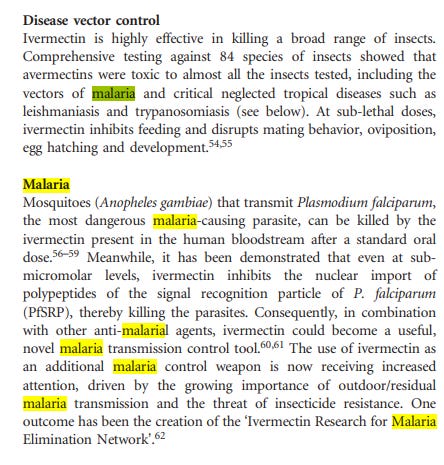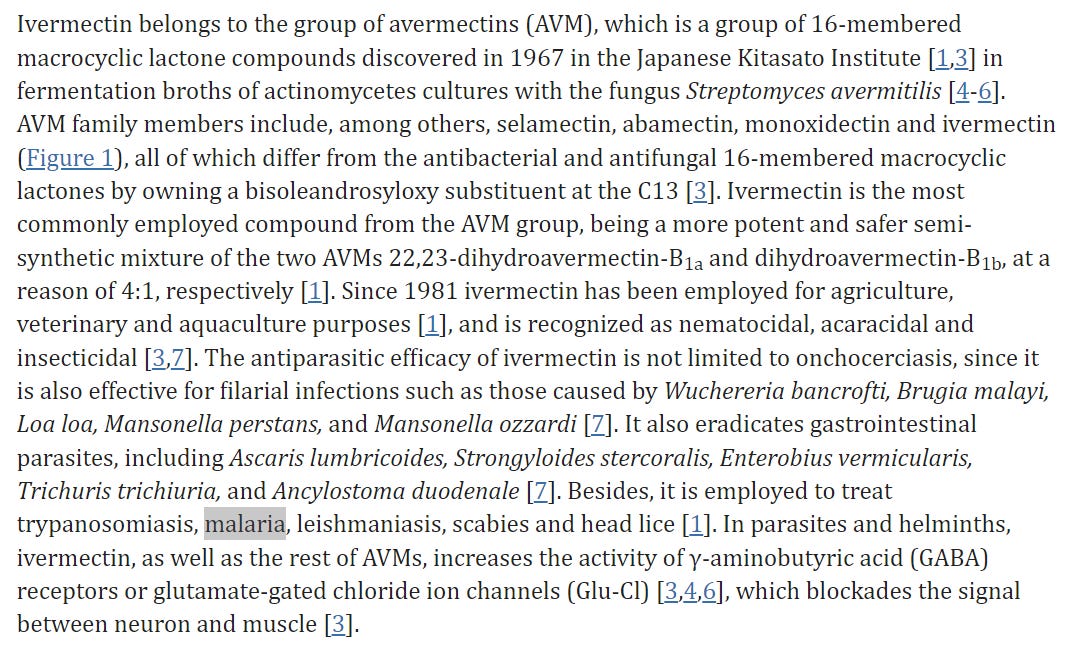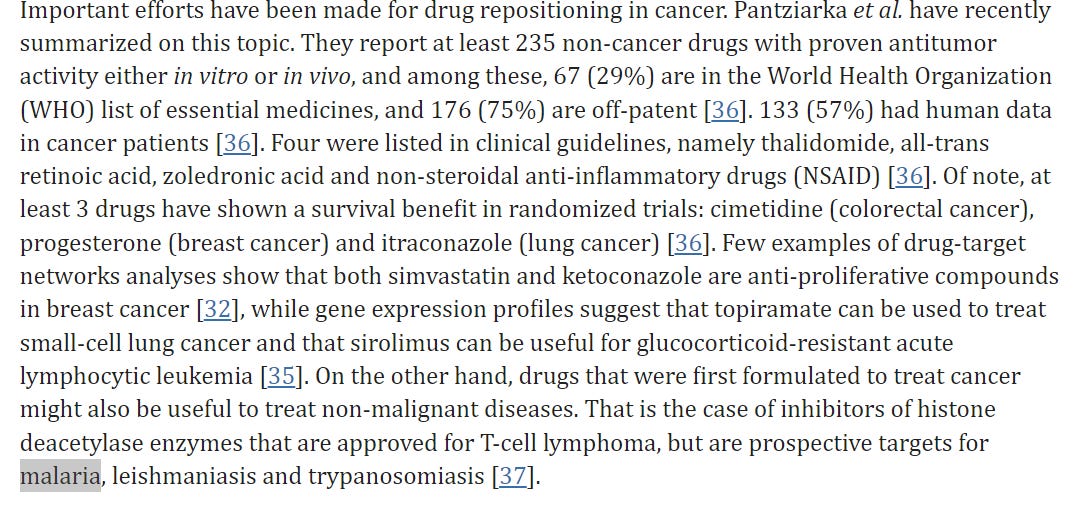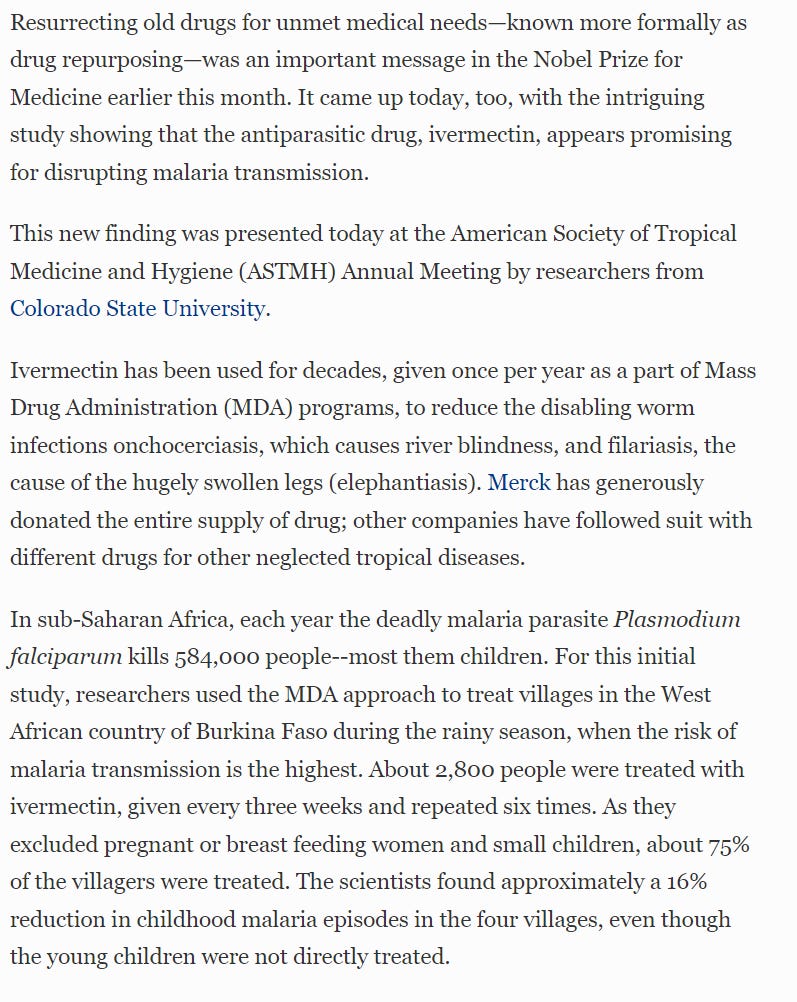https://edition.cnn.com/2023/08/18/health/malaria-maryland/index.html
Published 4:43 PM EDT, Fri August 18, 2023
Case of locally acquired malaria reported in Maryland
https://www.nature.com/articles/ja201711 Ivermectin: enigmatic multifaceted ‘wonder’ drug continues to surprise and exceed expectations | The Journal of Antibiotics (nature.com)
https://www.ncbi.nlm.nih.gov/pmc/articles/PMC5835698/ The multitargeted drug ivermectin: from an antiparasitic agent to a repositioned cancer drug - PMC (nih.gov)
How does this work? As Dr. Brian Foy, lead investigator, explained, only old female mosquitoes transmit malaria. It's also interesting that the malaria parasite takes two weeks to work its way into the salivary gland of the mosquito and during that time, it may bite up to five other people. If the villagers have received ivermectin, the mosquito gets multiple exposures to the drug. Foy continued, if you give ivermectin to the “Plasmodium in culture, nothing happens. It is not specifically toxic to Plasmodium. The effect is that when mosquitoes bite you, if you’ve taken the drug, it will die.” Transmission from person to person is thus reduced, leading to the drop in deaths. While Foy notes that "there isn’t anything a mosquito hasn’t developed resistance to," he's optimistic that this pulsed dosing of a mosquitocidal drug will be an important tool.
Not just Africa will benefit from Ivermectin. In a related study, Kevin Kobylinski of the U.S. Walter Reed Army Institute of Research (WRAIR) showed that ivermectin can block development of Plasmodium vivax parasites in mosquitoes that are common in Southeast Asia as well as killing the host Anopheles dirus mosquitoes. Kobylinski notes, “It can be hard to convince someone to take malaria medications if they don't have an active malaria infection," but hopes that people will be more accepting of ivermectin, even if they don’t yet have malaria, because it will effectively treat scabies.
Why care?
First, resistance to insecticide-impregnated nets has been rising globally, as has resistance due to pyrethroids now widely used in agricultural applications. Also, the mosquito’s behavior has been changing as it adapts, from biting indoors to outdoors, when bed nets or insecticidal sprays do not protect people, or to biting at different times of day.
There is hope that this pulsed use of ivermectin will help limit the emergence of resistance, as a mutant parasite would likely die in the mosquito, and thus not be further spread.
The major concern with this approach is whether the increased use of ivermectin would promote resistance against the soil-transmitted helminths (worms). Foy proposes that ivermectin might be used with another class of anthelminthic drug, to reduce this possibility.
While a bit concerned about resistance, Dr. Peter Hotez, Dean of Baylor's National School of Tropical Medicine stated, given “the possibility that ivermectin could also affect vector transmission as it has for scabies, the impact of Anopheles mosquitoes that transmit malaria is an interesting proposal and one that should be looked at in greater depth.” (!!!!!!!!!!!!!!!!!!!!!!!!!!!!!!!!!!!!!!!!!!!!!!!!!!!)
The Nobel Prize was awarded to three researchers this year. William Campbell and Satoshi Ōmura received the prize for their discovery of ivermectin, which has had a profound impact on reducing deaths from neglected tropical infections. The third award went to Dr. Youyou Tu, for discovering the value of artemisinin, now the mainstay in treating malaria. The description of her finding is telling:
She visited traditional medical practitioners across China, and from those conversations, compiled a notebook, "A Collection of Single Practical Prescriptions for Anti-Malaria." Among 2,000 traditional Chinese recipes, she said, one compound was found to be effective: sweet wormwood, or Artemisia annua, which was used for “intermittent fevers,” a hallmark of malaria.
The recipe that caught her attention, in a collection titled "Emergency Prescriptions Kept Up One’s Sleeve,” was written more than 1,600 years ago.
More globally, this report of successful repurposing of an old drug, ivermectin, for treating a totally different disease, is another important reminder that, particularly for urgent threats like antibiotic resistant superbugs or neglected diseases, we should reexamine our existing armamentarium. Older drugs, like many older people, are a source rich in treasures.








Quinine also fights malaria. From what I heard malaria causes hemoglobin to unbind from red blood cells leading to less oxygen being absorbed, and it seems COVID-19 did that in some cases too. Thus we had some people with COVID-19 gasping for air. Respirators didn't work because the red blood cells couldn't bind to the oxygen very well. IIRC quinine works to stop this unbinding. I wonder if Ivermectin works in the same way.
The British used tonic water with small amounts of quinine in it to prevent malaria, though the amounts are too small for treatment of an actual malarial infection.
Who would have thought that Dr.Peter Hotez of all people would make this comment about ivermectin . But has to add the old cliche ,"more information / studies need to be done" .
How many times have we heard this before , to never hear anything about it thereafter .
Lets hope ,this time ,it will be different.